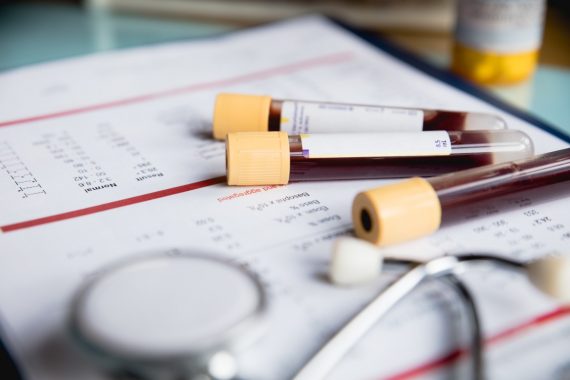A simple sex-specific blood test may one day be used to identify 18 different early-stage cancers, according to promising research.
Reporting their findings in BMJ Oncology, the team said the test, which is based on a panel of 10 proteins could ‘kickstart’ a new generation of screening tests for early detection.
In the proof-of-concept study, the team collected plasma samples from 440 people diagnosed with 18 different types of cancer before they were treated and 44 healthy blood donors.
They then measured more than 3,000 proteins in order to identify biological signatures associated with different cancers.
Through a process of elimination they discovered 10 sex-specific proteins differentially expressed among the plasma samples from cancer patients and healthy people.
Because the protein signatures they found differed significantly between men and women it is likely they are sex-specific for all cancers, the researchers explained.
On their own, the individual proteins were only moderately accurate when it came to detecting early-stage disease but the accuracy increased when combined, the team from the from the US biotech firm Novelna reported.
Their research showed the proteins could be used to detect stage I-III disease and all types of cancer, but they found they were particularly effective at picking up early-stage disease.
Overall, they identified 93% of stage 1 cancers among the men and 84% of stage 1 cancers among the women, with 99% specificity and 90% sensitivity in the men and 85% sensitivity and 99% specificity in the women, they reported.
‘Our new generation protein-based plasma test has shown high sensitivity in detecting a variety of early-stage tumours in asymptomatic patients, making it a strong candidate for use as a population-wide screening tool that is not currently achievable with existing tests or techniques,’ they concluded.
Other experts commented that the approach showed promise but urged caution because much work would need to be done before it could be used at a population level.
Dr Thomas Round, a GP and academic clinical research fellow at King’s College London, said: ‘Early detection is a key objective for improving cancer outcomes, and there is a lot of interest in multi-cancer early detection (MCED) tests in screening for cancer signals before symptoms develop.’
He said the approach of using plasma proteins was interesting though there are some limitations for the study including the relatively small sample size.
‘There needs to be further larger scale research, both observational and ideally a randomised trial into this specific test, including in different populations.
‘While this is interesting work in the rapidly developing field of MCED tests, this study shows the need for further trials in the area of early cancer detection.’


















There is a total lack of rational scientific background to this – it is just a money-spinning exercise.
Anyone with basic medical knowledge knows that there is NOT a SINGLE effective cure for ‘cancer’ (well, not apart from death anyways!), because there is NOT a SINGLE disease called ‘cancer’.
This screening test offers to give us thousands of highly anxious patients who have been fleeced by this company to pay it’s shareholders, who are worried sick because now they KNOW they have cancer, with 99% specificity PROOF that they have it. They will all present to GPs and Consultants wanting treatment. But what treatment should we offer? We cannot cut out the ‘cancer’ because we do not know where it is! We could send for multiple expensive scans and tests, and detect many many non-pathological anatomical anomalies, but in early stage cancers, we will fail to detect the earliest ones. Presumably private healthcare could offer 2- monthly repeat whole body scans, and confirmatory repeat blood tests to check patients still have ‘early stage cancer’, but, hey, I could charge patients £100 a time to tell them that just by looking at and sniffing them. So long as I am referring them all for further investigation to find what is asymptomatic and too small to detect, so there aren’t any clues where to look or what to treat, I could not go wrong!!!!!!!
Did it accidentally get published too early? was it meant to be printed in the 1st April edition of BMJ Oncology?
History is littered with people who predict new technology is useless, but just fail to grasp it’s significance.
My understanding is the new generation of tests DO identify which part of the body is most likely to be the source of the cancer, it is not just a yes or no test.
And while all new technology takes many steps of evolution before it is amazing, it has to start somewhere. Remember:
– the head of IBM said in 1947, that worldwide we would only need a total of 5 computers.
– In 1946 an exec at 20th Centuary Fox said that TVs would not be popular at all.
– The president of Michigan Savings Bank told Henry Ford that motorised cars were a fad and the horse is here to stay.
– Steve Jobs said subscription music was never going to work
– And in healthcare technology related to H/Pylori and monoclonal antibodies was ridiculed before they were actually proven to be effective.
[There is a lot of reporting bias – in that I’m sure there are loads of technology changes people say are useless and subsequently don’t make it]